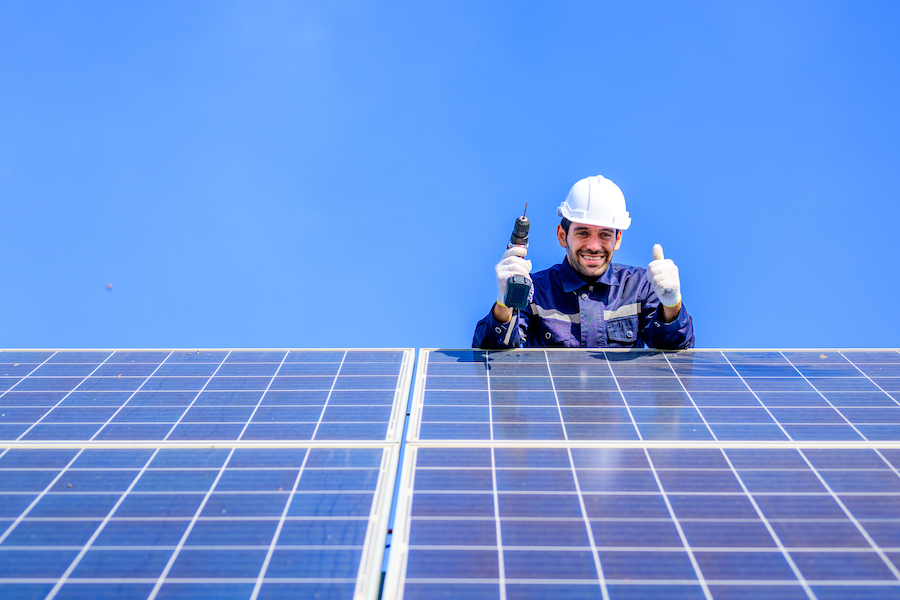
With Solartech solar panels, homeowners become electricity producers. System operators can use the electricity generated as required – excess electricity is fed into the power grid and paid for. But why does self-consumption make sense with the best solar panels in Florida?
What does self-consumption, feed-in & self-sufficiency mean?
Self-consumption means using the electricity generated by the best solar panels in Florida. This means that the electricity is routed directly from your system on the roof to the house’s consumers. For example, you can run your washing machine entirely with renewable photovoltaic electricity. If necessary, an additional power storage unit can also be added. This then temporarily stores excess electricity generated. Configure your Solartech solar panels now!
Feed-In
In return, feed-in means that the electricity produced by your system is routed or “fed” into the grid. You receive a feed-in tariff for every kilowatt hour (kWh) fed into the grid. It is 8.2 ct/kWh for small house roof systems of 1-10 kWp and 7.1 ct/kWh for systems between 11 and 40 kWp
Self-Sufficiency
The terms self-sufficiency and self-consumption are often used synonymously. If you supply your house with electricity and heat independently of the public supply, then we are talking about a self-sufficient home. Self-sufficiency in connection with the best solar panels in Florida means independence from the power grid.
When talking about a degree of self-sufficiency, what is meant is the proportion of your electricity requirement that you can cover with your photovoltaic system without drawing electricity from the grid. Conversely, the self-consumption rate indicates what percentage of the generated electricity you use yourself. Therefore, the degree of self-sufficiency is consumption-related, while the self-consumption rate is production-related.
Electricity Savings
Self-consumption of self-generated Solartech solar panels can generate electricity with your system below the regular price. Electricity from a house roof photovoltaic system can currently be generated. You save more with every self-generated kilowatt hour (kWh).
Since Solartech solar panels generate the most electricity, but households’ electricity requirements reach peak values in the morning and evening hours, your system cannot cover all of your consumption. Additional electricity must often be drawn from the grid in the mornings and evenings. The excess electricity generated at midday, on the other hand, is fed into the grid. With the installation of battery storage, it is possible to increase self-consumption further.
Environmental Protection
Installing the best solar panels in Florida means 100% renewable electricity. On the other hand, the electricity mix drawn from the grid is only 46% renewable. The remaining 54% of electricity is generated by burning fossil fuels or nuclear energy. Large amounts of CO2 are released when fossil fuels are burned. On the other hand, the use of atomic energy harbors a high safety risk with incalculably severe consequences for nature and people. With every additional kWh of solar power you generate and use, you protect the environment and improve your CO2 balance.
Grid Stability
It is often said that the increasing share of renewable energies endangers grid stability. This is also partly true for the amount of renewable electricity fed into the grid. For example, on a windy autumn day, large amounts of wind power are fed into the grid in addition to the average amount of electricity. Here, networks must be expanded over the long term and controlled intelligently while simultaneously reducing the output of conventional power plants. With the best solar panels in Florida and an optimized share of self-consumption, you even improve the grid stability. Because by generating and consuming your electricity decentrally, you bypass the power grids and thus relieve the grids.
Solar Panels + Storage
Combining your system with an additional storage unit can increase your consumption of Solartech solar panels to 50-80%.
Solar Panels + Heat Pump
In principle, without technical aids, Solartech solar panels can cover around 15% of the electricity requirement of an air-to-water heat pump and 25-30% of the electricity requirement of a hot water heat pump. This further increases your self-consumption rate. However, the same increase in the self-consumption rate varies greatly and depends on your heat requirements.
Solartech Solar Panels Offer Energy Solutions
The self-consumption rate indicates the percentage of self-generated solar power used to cover your electricity needs. In contrast to the degree of self-sufficiency, it is production-related and not consumption-related.
If you own Solartech solar panels and have not connected your system to a storage tank or a heat pump, you will achieve an average self-consumption rate of around 30%.

